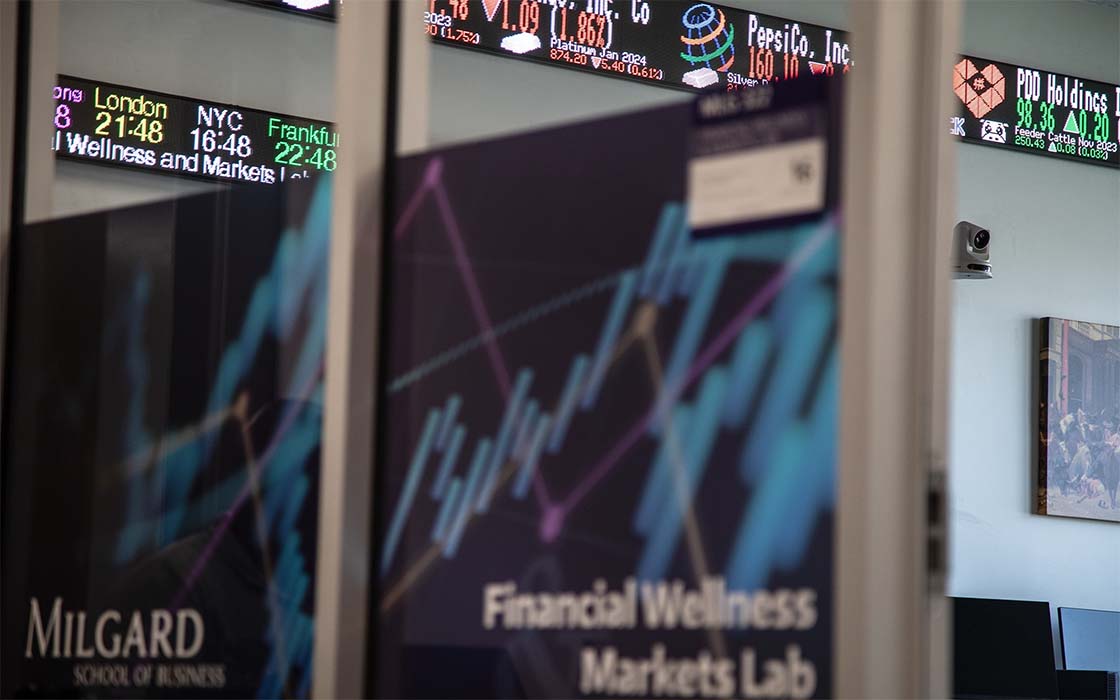
Encouraging Financial Wellness
Several new initiatives are helping instill financial literacy and resiliency into the UW Tacoma student body.
This Section's arrow_downward Theme Info Is:
- Background Image: ""
- Theme: "light-theme"
- Header Style: "purple_dominant"
- Card Height Setting: "consistent_row_height"
- Section Parallax: "0"
- Section Parallax Height: ""
Financial wellness is the state in which a person can address their present and upcoming financial responsibilities with ease while also enjoying life. For a significant number of Americans, such circumstances are elusive.
According to recent data from Bankrate, 56% of Americans do not have enough savings to cover a $1,000 emergency expense and one in three Americans, even those making over $100,000 a year, run out of money before their next paycheck. Likewise, credit card debt is the highest it’s ever been in the country’s history at over $1 trillion, and anxiety over finances is on the rise.
As a result of structural racism, and socioeconomic and political barriers, communities of color are disproportionately impacted by financial distress. Black, Hispanic, and Native American communities also have a more limited understanding of personal finance, budgeting and investment as compared to their White and Asian counterparts.
At UW Tacoma, the student body is 54% first-generation college-goers and 63% people of color, making it an ideal place to invest resources to address inequities. According to a 2019 survey of UW students across all three campuses, about 20% of students are facing food and housing insecurity.
With this in mind, UW Tacoma faculty and staff created two vital financial wellness programs on campus: the Financial Wellness Fellows Cohort and the Center for Financial Wellness. By working through shame, reducing barriers, and incentivizing success, these programs are instilling financial literacy and resiliency into the UW Tacoma student body.
Understanding the Landscape
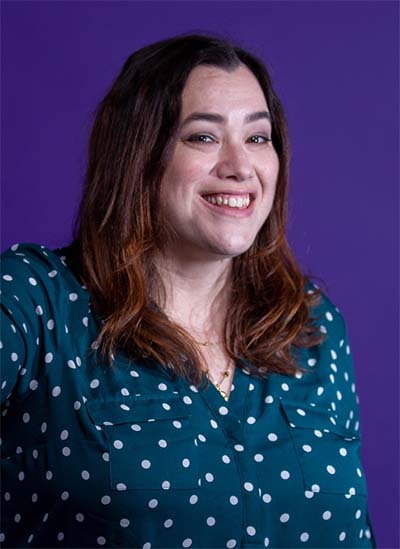
In 2018, Amanda Figueroa was considering how to better serve students, as she regularly does in her role in Student Affairs as Senior Director of Student Transitions & Success, when she received a note from Jeff “JD” Dade. At the time, Dade was a graduate student at UW Tacoma and working at Sound Outreach, a nonprofit focused on providing financial coaching, job training and other services to low- and fixed-income residents in Pierce County.
“He reached out and was like, ‘Hey, would UW Tacoma be interested in doing something around financial wellness?’” said Figueroa. “JD and I had an exploratory conversation and then a few colleagues and I went up to visit the Sound Outreach office to see them in action.”
(Dade went on to get his M.A. in Community Planning in 2020, complimenting his 2011 B.A. in Urban Studies. He received the UW Tacoma Distinguished Alumni Award in 2023.)
After that meeting, Figueroa and her colleagues discussed what a financial wellness program at UW Tacoma might look like. Eventually, they developed a proposal to solicit the sponsorship of WSECU, the Washington State Employees Credit Union.
“We proposed what was essentially a planning grant and said, ‘We want to work with students through UW Tacoma’s Global Innovation & Design Lab (GID Lab). We want to understand the landscape of what's happening in higher education with financial education,’” said Figueroa.
WSECU funded the proposal, allowing Figueroa and her colleagues to carry out an exploratory design process at the GID Lab to try out approaches and gather information from those directly impacted by economic injustice.
“Through our design work, we landed on two challenges we were hoping to address with the program. Anxiety and shame came through in every student interview we did, as did the issue of removing and reducing barriers, particularly how our students, many of whom are working full-time and raising families, can fit this learning into their busy schedules,” said Figueroa.
In the winter academic quarter of 2021, Figueroa and Student Transitions & Success proposed their answers to those pain points. The first idea was the Financial Wellness Fellows, to be established in collaboration with Sound Outreach, UW Tacoma’s Center for Equity & Inclusion, the Office of Student Financial Aid, and the Office of Student Advocacy & Support.
Financial Wellness Fellows
The Financial Wellness Fellows program is run by the Office of First Generation Students, but is open to all UW Tacoma students. The program is designed to impart essential financial skills to students and to offer personalized financial coaching. Through the program, the aim is that students are equipped to use financial wellness strategies in real-life scenarios.
“Students can apply online at the start of fall, winter, and spring quarters,” said Figueroa, adding that the program accepts up to 30 students per quarter. “There's a pre-test that students take to share their financial knowledge, asking them things like if they know what affects their credit score, and why it might be important to start working on credit early. That helps us get a sense of what each student’s base of knowledge is.”
From there, each student goes through an orientation called the Financial Fear Workshop, led by certified financial counselors from Sound Outreach, which gives students a place to talk through financial stress and anxiety.
“Sound Outreach has been an incredible partner because they've been in Tacoma’s Hilltop for a long time and they’re very used to serving clients like our students. They are fiduciaries and they have the highest level of certification you can get as a financial counselor. We really trust them to do this work with us,” said Figueroa.
In order to make it flexible enough to fit around students’ lives and required studies, the cohort may choose from a menu of financial literacy learning experiences including one-on-one meetings with a Sound Outreach financial coach and budgeting workshops. These offerings are incentivized with participation points fellows can earn and cash in toward a textbook scholarship of up to $300.
“I call it learn-to-earn. The more you do, the more of an incentive you earn,” said Figueroa. “This is to reduce barriers to participation, and over the last three years we’ve seen applications triple.”
Center for Financial Wellness
Meanwhile, inside the Milgard School of Business, the push for financial wellness among UW Tacoma students is just as strong.
The Milgard School’s Center for Financial Wellness (CFW) opened in March and offers resources and events to help students gain money know-how. As of October 2023, CFW is now operating with a new Financial Markets Lab, equipped with a stock market ticker showing current financial data, a world clock, and several Bloomberg terminals to give students access to more experiential learning.
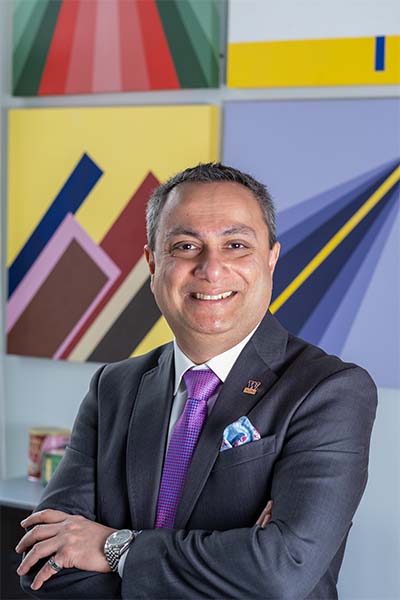
The idea for the Milgard Center for Financial Wellness and the new Financial Markets Lab sprang from a thought-provoking experience that Dr. Altaf Merchant, dean of the Milgard School and professor of marketing, had in 2019.
“At that time, my office was in Dougan, and one evening there was a student waiting outside. I asked the student if he needed anything, and he said he wanted advice because his tuition was due, and he wanted to pay his tuition using his credit card,” said Merchant.
“He was wondering whether he should do that and, of course, I advised him not to pay by credit card because of the high interest rate. But that got me thinking: ‘Our students don’t know the basics of finance.’”
Merchant had already been thinking about how to improve students’ financial education. He was looking at what other universities were doing, and noticed they all had trading rooms with Bloomberg terminals to help students understand market data and investments. Inspired by his encounter with the student at UW Tacoma, he set out to marry basic financial literacy and a financial markets lab into one resource center, the CFW.
The CFW, made possible by a generous donation from Sound Credit Union, has two focuses: to equip students with basic personal finance knowledge through a financial literacy component and to teach them how to generate long-term wealth through the financial markets lab. The CFW has two directors, one for each initiative.
“It's not just for finance students to become even better at what they're doing and get them high-paying jobs. The need is much broader for financial education,” said Merchant. “The foundational education is how to balance your checking account, how to take out a loan, how to buy a house, how to save some money. Then it comes to encouraging students to save money and invest, and ultimately generate wealth. That's the scope of what we’re trying to address with the CFW.
Financial Literacy
The CFW offers workshops and events throughout the year, usually during the lunch hour, the best time to get wide student participation at a mostly-commuter campus like UW Tacoma. Topics cover practical personal finance knowledge like how to qualify and apply for a loan as a first-time home buyer, how to understand your credit score, and how to buy a car, all with the hope of giving students a comprehensive view of what managing money actually involves. These workshops are free and open to all UW Tacoma students.
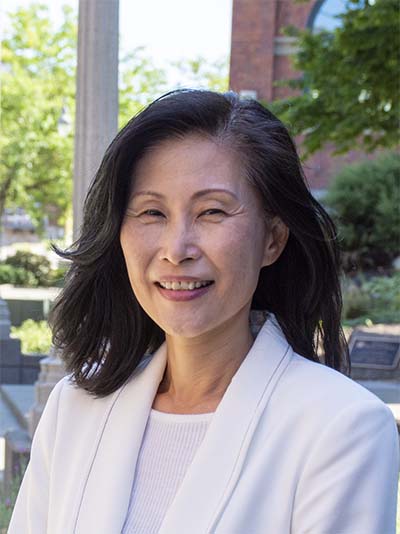
Hui Suk So, Assistant Teaching Professor and director of the Financial Literacy Initiative at the CFW, says the goal is to provide students with financial confidence, and to show the importance of managing your money, no matter how much you currently make.
“One thing that I hear a lot is, ‘My family doesn't have very much money. I don't have very much money. Why do I even need to have a budget? We're just barely getting by,’” said So.
It may seem counterintuitive, but this is when budgeting is most important. “You're creating spending discipline for yourself and that’s especially important when you have limited resources,” she said.
Another thing covered on the financial literacy side is investing basics, especially since 2021, when millions of people, inspired by internet memes, bought stock in the failing video game store GameStop. That piqued students’ interest in investing, said So, and now many students are investing in Tesla.
“They think, ‘Oh yeah, if you invest in Tesla, you can't lose.’ But there are risks involved, so we also talk about that side as well,” she said. “One thing that we learned is a lot of students don't know about the difference between a traditional IRA and a Roth IRA and things like that. So, we try to teach them the fundamentals and let them know that they could start investing today.”
The CFW also awards up to $15,000 in financial literacy scholarships to 10 UW Tacoma students per year, with preference given to first-generation and need-based students. These scholarships are designed to further incentivize and inspire students in underrepresented groups to bolster their financial acumen.
A Mock Stock Market Experience
Stock market know-how is also where the Financial Markets Lab, which holds its grand opening on October 9th, comes in.
Located inside the CFW, The Financial Markets Lab has a stock ticker, a world clock, and Bloomberg terminals, workstations that connect to Bloomberg’s proprietary data systems used by financial consultants and corporations. The terminals allow students to see and analyze real-time market data, conduct trading games, and create theoretical managed investment funds. Getting these terminals — there are seven of them — was no easy feat. An annual subscription for one terminal can cost up to $27,000 per year. But the payoff for Milgard students and the whole UW Tacoma campus will be worth it.
“This is bringing the real world into the classroom,” said Merchant. “Bloomberg data shows you price-to-earnings ratios, equity ratios, stock market movements, all in the current moment. You can see how a company is doing in China or India. We’ve also changed our curriculum to include the Bloomberg terminals.”
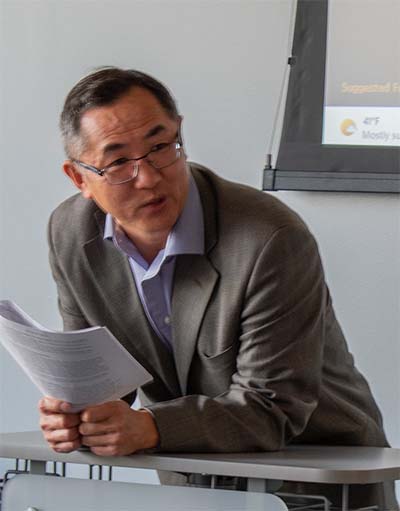
Six finance classes within the Milgard School of Business have been retooled to incorporate the Bloomberg data made accessible by the new lab. Dr. Fei Leng, associate professor in the Milgard School and director of financial wealth creation at the CFW, is even requiring some of his students to use Bloomberg data in their capstone projects.
“This is my 18th year teaching finance at UW Tacoma. I’ve always noticed that the first time students take finance courses, they're excited because they get to think about money. But once they learn more about finance it gets pretty intimidating because it involves a lot of math and abstract theories, and they start to lose interest,” said Dr. Leng.
With its tangibility, the Lab offers students a different way to relate to finance. The hope is that, eventually, the Lab will help Milgard’s finance students earn Bloomberg certifications, which will bolster their resumes. Both Merchant and Leng note that the Lab isn’t just for finance students. It offers real benefit to students in the broader UW Tacoma community by simplifying and driving interest in financial markets. This is particularly true of the tickers.
“The reason people feel markets are risky is because they don't have enough knowledge. The ticker arouses their interest, drives them to learn more, and that helps dispel the fear,” he said.
In other words, imparting actionable skills in wealth generation is one thing, but whether a student applies them depends on their interest in the market. Dr. Leng believes the lab will drive that interest and inspire students to be more ambitious about their money and futures.
Having an Impact
It’s too early yet to know if the Lab will catapult UW Tacoma students into wealth, although Dr. Leng is confident that increased financial literacy and bona fide skills in wealth generation will disseminate broadly across campus.
“In the Milgard School itself, we hope to see an increase in finance enrollment, and also business enrollment and eventually we hope we'll see more of our students go into finance and investment industries,” said Dr. Leng. “More broadly, this is not just about intergenerational wealth transfer, it's also about intergenerational knowledge transfer. We educate UW Tacoma students so that in the future they can pass financial literacy to their children.”
Plus, now Milgard has a “home” to welcome finance and business alumni back to educate students. On Oct. 9th, as part of the official grand opening of the Lab, the CFW will host its first Lunch-and-Learn of the 2023-24 academic year, featuring Dan Wickens, ’13, B.A. Business Administration/Accounting, the author of “Healthy Dough: Ingredients for the financial health you crave.”
Over the past year, the CFW held ten workshops, panel discussion, seminars and gaming sessions on topics ranging from understanding crypto, opening a bank account, and saving and managing money, to understanding credit scores and financing major purchases. Seventy percent of 250 student participants came from majors besides business. Of the ten financial literacy scholarships funded by the CFW, nine went to non-Milgard students.
So wants to roll out assessments to better measure the Center’s efforts over the next few years. Anecdotally, it’s evident to her that the CFW is helping students make smarter money choices.
“Our students have come to me and said, ‘Hey, I've opened a Roth IRA, I'm really excited.’ Or some students say, ‘I never really took advantage of my company 401K, but now I'm enrolled.’ To me, that's success,” said So.
Success describes the outcomes of the Financial Wellness Fellows program, too. Through a series of assessments of 92 participants in the program so far, 76% were first-generation students and, in their post-cohort reflections, they reported increased confidence in their financial literacy, increased ability to apply that knowledge in everyday situations, and a renewed sense of self-acceptance and connection.
“We know there's an economic gap for first-generation graduates compared to continuing-generation graduates, and our assessments show that our program is directly addressing that gap,” said Figueroa. “At the same time, students are telling me, ‘I'm connecting with community and building a stronger sense of belonging.’”
Recent news
Main Content
Gathering Strength
News Tags on this arrow_upward Story:
- None
Main Content
UW Tacoma Enrollment up 4% for Autumn 2024
News Tags on this arrow_upward Story:
- None
Main Content
Celebrating First Gen
News Tags on this arrow_upward Story:
- None



